Piper L-4H Grasshopper, Wickers Cross, Stackallan, Meath
On the 5th of May 1944, one of the stranger incidents of the wartime landings occurred. At 9:30 that day, not one, but two, military aircraft landed in a field at Stackallen, County Meath belonging to Captain K Allison. These were perhaps the most harmless of the aircraft that visited Irish shores during the war. On the other side of Ireland, an aircraft of a much more warlike complexion landed near Foxford, County Mayo, you can read the story of that landing at this link.
The Irish military later recorded that the two aircraft had been observed west of Brackenstown (North County Dublin) moving south and later were heard by military posts in the Dublin City area circling around and then heading North. They later landed around 9:30 in the morning on May 5th.
The two aircraft turned out to be US Army Piper L-4 Grasshopper spotter aircraft. And they themselves were harmless and unarmed they would go on to provide deadly support to the US Army during the campaign in Northern Europe and elsewhere they carried out the artillery spotting role with deadly efficiency along with other vital roles such as casualty evacuation and liaison flights.
The two pilots made contact with a local hackney driver and asked to be driven to a petrol station. The enterprising driver, named in the Irish Army reports only as Moran, took the opportunity to take his two passengers to the nearest Garda (Police) station in Navan town where they were taken into the care of the local police and given food and refreshments. The two airmen explained to the Gardai and later the military that they were flying from Scotland to a place in Northern Ireland which the Irish military recorded as "Blessington Barn" near Fivemiletown. They had had to deviate from their intended course due to weather and found themselves over Dublin. It was after they turned for Northern Ireland and attempted to fly up the coast that they found they would not have sufficient fuel and elected to force land the aircraft.
Captain Teague and four enlisted men were dispatched from the
Irish Air Corps with a fuel bowser and dispensed 19 gallons of
DTD224 fuel to the two aircraft during the day. There is a hand
written memo in the Irish Army file stating that the military
authorities were told to allow the aircraft to leave "since aircraft were on a ferry flight and
therefore on non-operational work crews and aircraft may be
released". This message was forwarded to the
Gardai in Navan for notification to Comdt. Harrington who was
the Eastern Command Intelligence officer and was present at the
scene. Finally at 16:20 that afternoon, both aircraft took off
again from the field and flew on to Northern Ireland.
Eighty one years after the event, the family of the hackney
driver were able to identify him as their grandfather as John
Moran, who was a local shop keeper along with his driving
business. They went on to say: My uncle was was milking the cows when the
plane landed and he ran up to the shop to get grandad. He
came down and there were 2 pilots. They thought they may
have landed in Germany and were very cautious. As
grandad had been in the army he knew to contact them
and they arranged to have fuel brought to the plane. While
they were waiting Gran made tea and sandwiches, however one
pilot had to stay with the plane at all times so they took
it in turns to go up to the shop for refreshments.
When they took off they circled the house and did dips with
the plane to say thank you.
The name of the two pilots were recorded variously in the Irish Army report as Lt Jack R Kirkpatrick and Lt Barney or Bernard Coen/Cohen. The Irish officers noted that Lt Coen said his parents were Irish and that he had relatives in Tuam and Ballinasloe, both towns in Galway. This story is recounted in the "The Fighting Grasshoppers" by Ken Wakefield where he identifies the two aircrew as 1st/Lt Jack R Kirkpatrick of the 8th Infantry Division Artillery HQ Battery and 2/Lt Bernard J Coen of the 45 Field Artillery Battalion. At this time, May 1944, the US Army 8th Infantry Division was stationed in Northern Ireland, having arrived in Belfast in December 1943. The Artillery Units were based at Blessingbourne Estate, just outside the town of Fivemiletown, County Tyrone. This would explain the misinterpreted place name of Blessington Barn recorded by the Irish Army. Today, the estate is a hotel/guest house with surrounding gardens.
Using available military records and family history records it was possible to learn a little more about the two pilots who flew into Wickers Cross that morning.
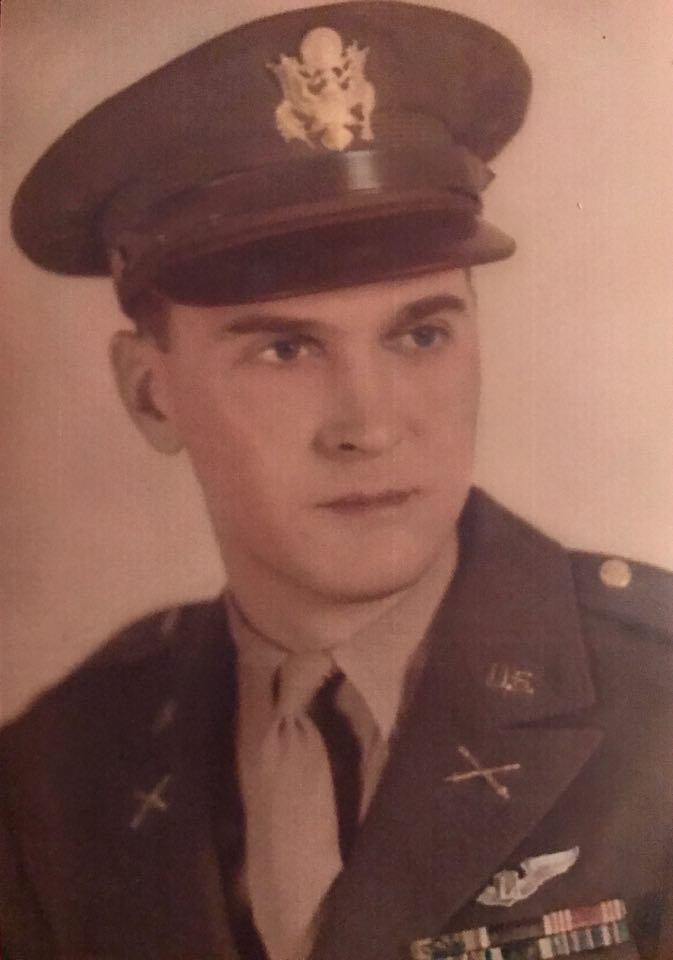 Jack Reid Kirkpatrick
was born in 1914 in Urbana, Illinois to Leslie and Ombra Kirkpatrick. In 1038 he graduated
from University of Illinois with BA degree. He went on then
to graduate from the University of Illinois, College of Law,
on June 1, 1942. Jack took flight lessons during the
summers and got his pilot’s license. He enlisted in U.S.
Army on the 2nd of June 1942 at Chanute Field, Illinois and
was trained as a “Field Artillery Liaison Pilot”. In
September 1943 he is found at Camp Forrest, Tennessee, in
the morning reports for the 43rd Field Artillery Battery and
the Headquarters battery of the 8th Infantry Division.
He first appears as a Staff Sergeant but is commishioned as
an officer on or around the 20th of the month. By
February 1944, he is found based at Fivemiletown, County
Tyrone on detached service from Antrim. He served in
the 43d Field Artillery Battalion of the 8th Division,
spending 19 months in the European Theater and participating
in the Normandy invasion. As of late 1944 he had flown
35 combat sorties with 300 combat hours.
Jack Reid Kirkpatrick
was born in 1914 in Urbana, Illinois to Leslie and Ombra Kirkpatrick. In 1038 he graduated
from University of Illinois with BA degree. He went on then
to graduate from the University of Illinois, College of Law,
on June 1, 1942. Jack took flight lessons during the
summers and got his pilot’s license. He enlisted in U.S.
Army on the 2nd of June 1942 at Chanute Field, Illinois and
was trained as a “Field Artillery Liaison Pilot”. In
September 1943 he is found at Camp Forrest, Tennessee, in
the morning reports for the 43rd Field Artillery Battery and
the Headquarters battery of the 8th Infantry Division.
He first appears as a Staff Sergeant but is commishioned as
an officer on or around the 20th of the month. By
February 1944, he is found based at Fivemiletown, County
Tyrone on detached service from Antrim. He served in
the 43d Field Artillery Battalion of the 8th Division,
spending 19 months in the European Theater and participating
in the Normandy invasion. As of late 1944 he had flown
35 combat sorties with 300 combat hours.
His local newspapers reported much of his 1944/1945 activity when they could. The Evening Courier from Urbana published the following on May 11th, 1945:
Kirkpatrick
in Push on Ruhr
First Lieut. Jack Kirkpatrick of Urbana observed
and called artillery fire on 150 or more German
vehicles jammed on a road for more than an
hour during the recent Ruhr push, according to a
dispatch from the eighth infantry division
in Germany.
A flying observer for the "Golden Arrow"
division, he became greatly exhilerated
by his mission, in which he reported his
findings to guns by radio, it was pointed
out. The dispatch relates that Lieutenant
Kirkpatrick had "a flier's delight served to him
in the shape of long lines of retreating
enemy columns. "If constant shelling
wasn't a grim reminder that this was a
deadly battlefield, one could have easily
believed that the lieutenant had been
granted a discharge as one listened to
his repeated shouts of 'I can't stand it-it's
wonderful!' over and over again."
Son of Mrs. Ombra Kirkpatrick, 208
West Illinois street, the lieutenant, who led a
dance band here when he attended the
University of Illinois, left the law
school in 1942, to enter service. His outfit was
credited with a 45-mile thrust, which
split the Ruhr pocket and took more than
48,000 prisoners, hundreds of vehicles
and vast stores of materiel.
The division previously fought in the
Roer river crossing, the drive to
Cologne, Hurtgen forest, Luxembourg, the push
through Brittany, and the capture of the
Crozon peninsula and the Normandy breakthrough.
He holds the Air Medal with three
clusters.
On the 16th of July, the Courier carried a long
article, with a photo of Jack across two pages:
Artilleryman
has Air Medal
Lieut. Jack Kirkpatrick Piloted Cub
Lieut. Jack Kirkpatrick, who served 19 months in
Europe with the famous Eighth division field artillery,
has the distinction of wearing the Air Medal and four
oak clusters to it.
As a liaison officer for the 43rd artillery group
he flew more than 300 combat hours to have "a ringside
seat" in a cub plane through the actions of his division
from D.Day plus 28 in France to V-E Day in Germany.
Directing the fire of the artillery from his seat
in the tiny cub, Jack started in the La Haye du Puits
region, went on to Reims and then to Brest.
Nazis Outran Artillery
"Brest is a big seaport. We had them cut off all
around, but we stayed there nearly a' month cleaning
up," said the cub pilot.
"Siegen on the Sieg river was where we went next.
We had a tough time there. We lost a lot of lieutenants
who served as observers. We pilots often flew, observed
and directed fire by ourselves. The Germans were already
short on transportation then. They were pulling their
guns by hand and they were using cows and horses, but
they didn't have many horses. They'd come down the road
two and three columns abreast. We'd drop one shell
halfway down the road and they'd be blocked. The only
place some of them could get away from the shells we
sent over after that was in the ditch.
"After
we took Siegen the Eighth took those 130,000 or so
prisoners in the Ruhr pocket. The next big town was
Olpe. There the Germans were moving back so fast
that we could hardly reach them with our artillery. The
doughboys and the tanks had come up but the artillery
hadn't kept up. I took off with a guy named
Miller. There were Germans as far as you could
see. We shot up a mess of them with our artillery until
they got so far ahead the guns wouldn't reach. The only
gun in the division that would was a big howitzer they
pulled up behind a two and one half ton G. M. C. We shot
that steadily for over an hour.
Hit by Sniper
"Just before the breakthrough in the Ardennes Bulge we
were at the northern tip of Luxembourg, but we exchanged
places with the 28th division and went up almost to
Aachen. Two days later the December breakthrough came
and the 28th took the battering we missed.
"The winter fighting in the Hurtgen forest area was
perhaps the worst of the whole war for the Eighth
division. The men on the ground couldn't see a thing and
it was bitter sold. We were on the east side of the Ruhr
river and the Germans were on the west side. We sat
there about all winter. We'd send out a patrol or two
and bring in prisoners and they'd do the same. We flew
around and picked up their positions. Our only heat came
from a little outlet off the motor. Most of the
time we flew from 1,000 to 1,500 feet. The temperature
drops three degrees each thousand feet.
"The day we took Cologne we were flying around 400 feet.
The armor was going down the main thoroughfare and I
thought if I stayed behind it, I'd be all right. When I
had to circle around the block, a sniper fired on us.
Lieutenant Pfefferle, whose father is a judge in
Columbus, Ohio, was my observer. He said in a quavery
volce, 'are you hit?' and I answered just as shaky.
'yes' but I didn't know where right then. I'd stopped
that sniper's bullet in the left cheek of the rear end.
It wasn't bad enough to earn the Purple Heart. It was
just a scratch.
"We'd been at Schwerin about 18 miles south of the
Baltic, around two days when the war ended. We'd cleaned
up the Rhur pocket and joined the British second and the
82nd airborne for awhile. The Germans by that time had
lost all their transportation. All we did was collect
prisoners. We sent out road blocks, a machine gun and
four or five men. The Germans were coming in four
abreast as far as you could see. We'd search them and
then pick out a good open field and herd them into it."
Graduated from the University of Illinois College of Law
June 1, 1942, Kirkpatrick enlisted in the army at
Chanute field the following day, before he had a chance
to try out his profession. For the past year, however,
he has had a good deal of experience in military law
serving on general court martials.
While Kirkpatrick, who earned his way through law school
conducting a campus dance band, says that any man who
wants to go on to the Pacific is "crazy," he is ready to
go there if he is needed. After his leave here
with his mother, Mrs. Ombra Kirkpatrick, 208 West
Illinois street, he will report at Fort Leonard Wood,
Mo., where the Eighth division is to be reassembled.
Among his awards were,
· Air Medal with 4
Bronze Oak Leaf Clusters.
· European Theater
Ribbon with combat stars for Normandy, Northern France, the
Rhineland and Central Europe.
· Purple Heart for
wounds received taking anti-aircraft fire while flying over
Cologne.
He was honorably discharged in October 1945, at Fort Leonard
Wood, Missouri
Jack passed the Illinois Bar Exam in 1946 and was married in
1947 to Mary Ladd Adams and moved to Galesburg, Illinois
where they raised their family. He remained in the
military post war it seems as a National Guard member, being
mentioned in 1948 as a Piper L-16 pilot with the 1st
battalion, 123rd Infantry based at Illinois University
Airport. Jack served many years as an Assistant States
Attorney for Knox County, Illinois, and then Magistrate
Judge.
He passed away in Galesberg in 1977.
Photo kindly supplied by grand daughter, Catherine.
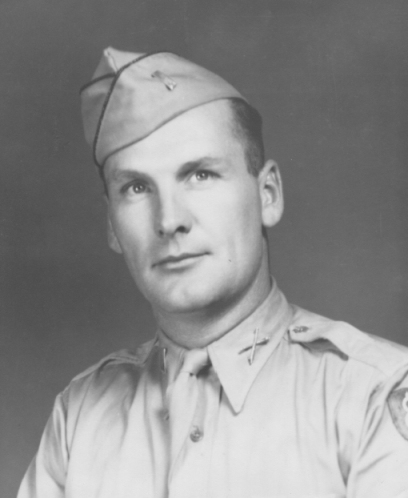 2/Lt Bernard J Coen
O-2045158 was difficult to find since his name had been
recorded in the hand written portions of the Irish Army report
and elsewhere as Coon and Cohen. However it was possible to
contact his daughter Mary who confirmed that the story of
Wickers Cross related to her father, Bernard J Coen.
2/Lt Bernard J Coen
O-2045158 was difficult to find since his name had been
recorded in the hand written portions of the Irish Army report
and elsewhere as Coon and Cohen. However it was possible to
contact his daughter Mary who confirmed that the story of
Wickers Cross related to her father, Bernard J Coen.
Bernard was the son of Nora and Patrick Coen, who had come from
Ireland in 1908 from Ballinasloe, in Galway. Baernard was
born in 1914 in Sioux City, Iowa. Indeed, his
parents origin was recorded by the Irish Army, after he told the
officers he had relations in County Galway. Bernard, or as
he was known to friends, 'Barney', married his wife Ellen
Buckley in Sioux City in November 1939. They can be found
living in the city on the 1940 census and both were sales people
in a department store.
He enlisted in the Army in September 1942 in Omaha,
Nebraska. His local papers published frequent newspapers
articles about him advising on the number of sorties he had
flown and awards received.
Similar to Lt. Kirkpatrick, his local town papers printed his
frequent promotions and awards. On the day after the
landing in in Stackallen, The Sioux City Journal printed his
photo along with notice of his promotion: Informed in Ireland as to his
promotion to a lieutenancy was. Bernard J.
Coen, who enlisted here as a private 20
months ago. Now a pilot on a reconnaissance
plane, Lieut. Coen received his early training
at Stevens, S. D., under Morningside college
instructors. His parents are Mr. and Mrs.
P. F. Coen, 1404 Blair street, and his wife, who resides
here, is the former Ellen Buckley.
In March 1945, his award of a third oak Leaf Cluster to the Air
Medal for flying 140 missions directing artillery fire with the
8th Infantry Division was printed in many Iowa papers. Two
months later, he was mentioned as having six oak Leaf
Clusters. He is found mentioned in a newspaper article as
being best man at a wedding in Sioux City on July 30th 1945.
His daughter was able to report: "I
have 2 of his 3 flight books and show Barney in Camp Forest,
Tenn, USA on 11/16/1943 and next log is Northern Ireland on
2/12/1944. He was flying a Cub - L 4 H with Army markings,
engine make Con-65 and doing field work. On 5/1/1944 he
notes that he was ferry plane from Wantage, England T.I. (I
think it means to Ireland). Noted that back on 5/11/44 back
to doing field work in Northern Ireland. On 6/27/1944 he
notes Northern Ireland to Normandy and on 5/10/44 he notes
Combat missions over France. On 7/13/44 he notes 2 bullet
holes wing and turtleback. On the 15th he was back in combat
still in France. On 7/27/44 he notes hole in wing. On
8/31/44 he notes two bullet holes in tail. On 9/1/44 notes
combat missions Luxenbourg (orders state Beilefeld,
Germany). On 11/2/44 he notes combat missions in Germany. On
12/3/1944 his plane was strafed and grounded by ME 109,
replaced. New plane was Cub L4-J stating engine was still a
con65. He notes he is still in Germany. He remained in
Germany until 6/12/1945 and then orders to drive to La
Harve, France via Brussels, Belgium. Then on 8/8/45 he was
back at Fort Sill, Oklahoma USA in a Stinson-L90 engine LY
190 and he was doing something called Link Trainer. On 8/31
he mentions a Stinson L5E, with engine LY 190. On 8/31 he
also mentions a L4 Cub, engine Con65. He flew the L4 Cub to
Fort Leonard Wood, Missouri USA on 9/8/45. He was there
until the end of the month. On 7/9/45 he was to return to
Fort Leonard Wood, Mo. the US." Then records show that he
was an army trainer until he was discharged in September of
45."
Upon his return from war, barney and Ellen lived in Sioux City
until 1956, then moved over the years to Minneapolis, then
Denver, Colorado and finally to Portland, Oregan where he
retired. In retirement, they moved to Eugne, Oregan.
Barney passed away in his native Sioux City in January 1992.
He is pictured here with a liaison aircraft in the background at
an unknown location.
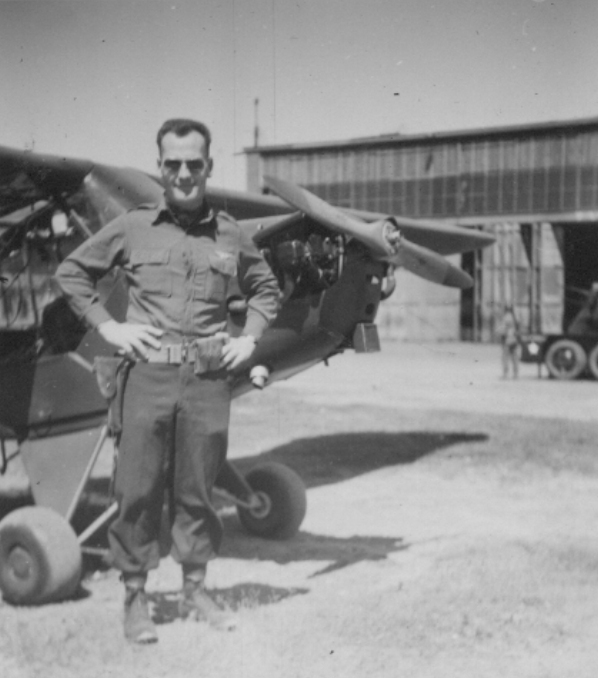
Some other photos from Barney's collection are displayed below,
sadly no information was recorded as to who was in the photos
other that Barney himself is evident. Scroll down to see the
photos. If you can identify any of the people, please do
contact me.
This image of Barney shows him next to a Civilian registered
aircraft. His diary records him flying a Taylorcraft aircraft
registration NC36337. This photo dates from 1947 and must have
been taken in Sioux City.
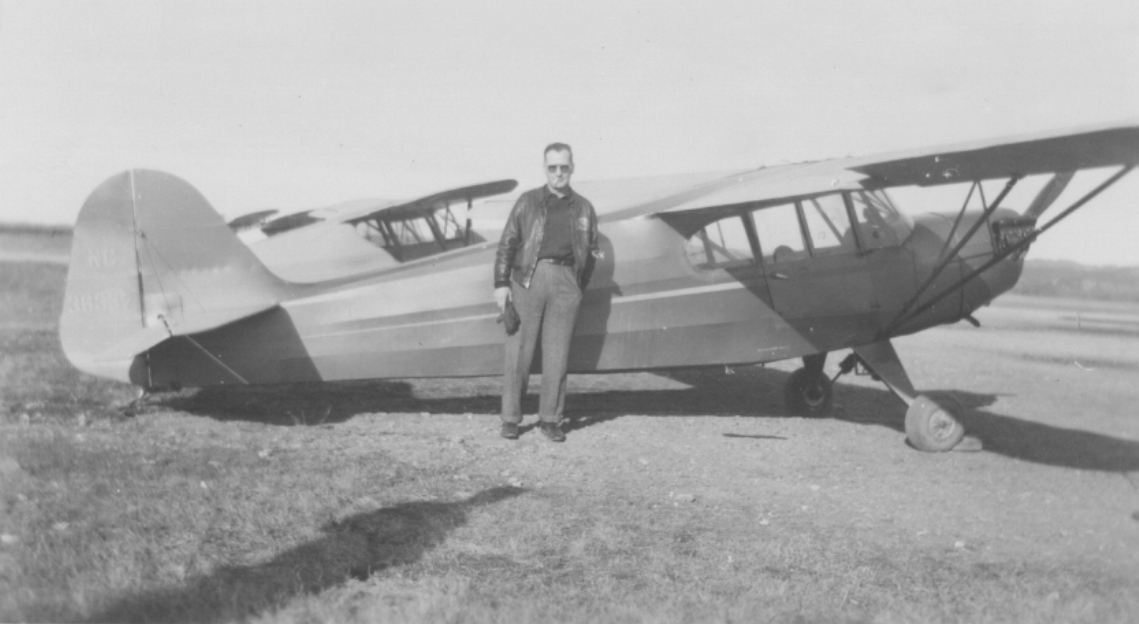
And of the two aircraft, the serial numbers 43-30052 &
43-30151 were recorded by the Irish Army. 2/Lt Kirkpatrick was
recorded as flying 43-30052 with 2/Lt Coen in 43-30151. These
were US Air Force serials allocated to Piper L-4H Grasshopper
liasion aircraft. Colin Smith from the Air Britain historian's
forum provided the history of the aircraft from their Air Force
history cards. Both airframes were distributed from the Air
Force to Army Ground Forces in the spring of 1944. They served
with the Army for the remainder of the war before being declared
surplus in 1946 and were allocated for sale. Nothing is known of
the history of 43-30151 after this time but 43-30052 is still
flying in 2012. It was sold to France after the war and in 1950,
went onto the civilian registration, since then it has been
registered as F-OAEB, F-BHEB and finally F-GRVN as she is marked
now. You can view a video taken during a flight on this aircraft
at the link below.
Vol en Piper Cub - Saint Nazaire - Angers
Marcé... by docdecibel
Two photos of the aircraft can be found at this French Aviation website.
Contact was made with the owner of the aircraft in 2023 and
they were able to provide these wonderful images of the
aircraft.



Bernard Coen's wartime images
These four photos were among Bernard's things.
The following two images seem to show Barney, on the left in
both photos, with the same person. The second photo is
presumably taken in wartime France or Germany. Do you know
who this man on the right is, he may have served with the air
liaison unit in 8th Infantry Division or have served with the
artillery units of this Division.
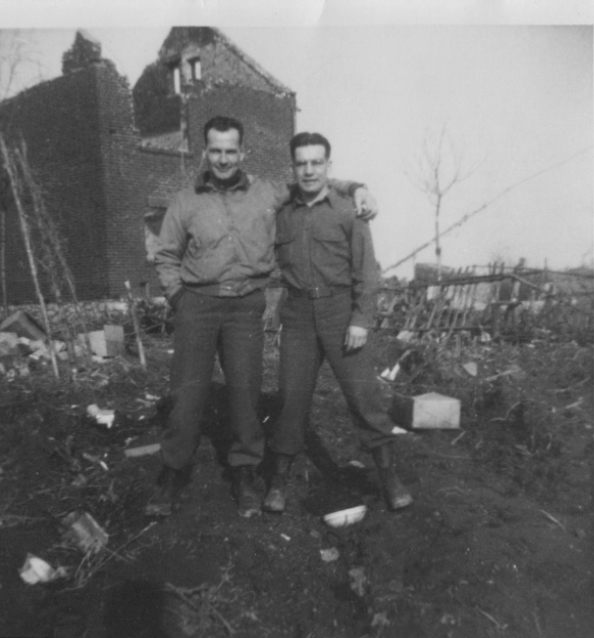
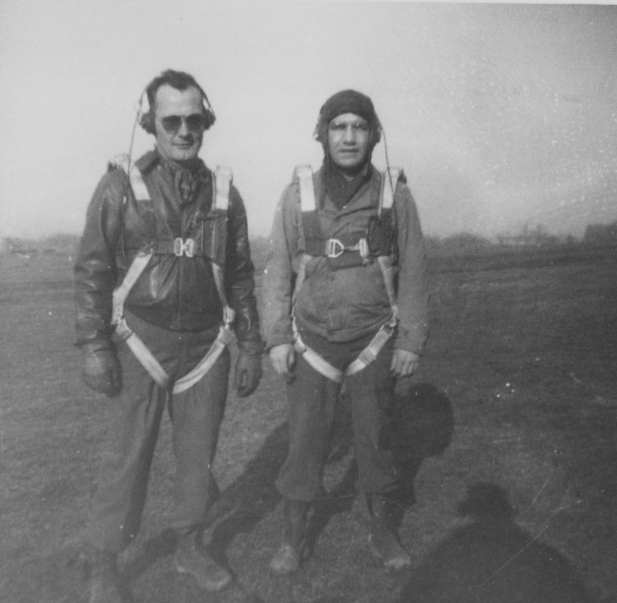
This image below is evidently taken in the German City of Duren
which was captured by the 8th Infantry Division around the 25th
of February 1945. A tank with a man standing at the turret can
be seen in the background with a body of water to the right hand
side.
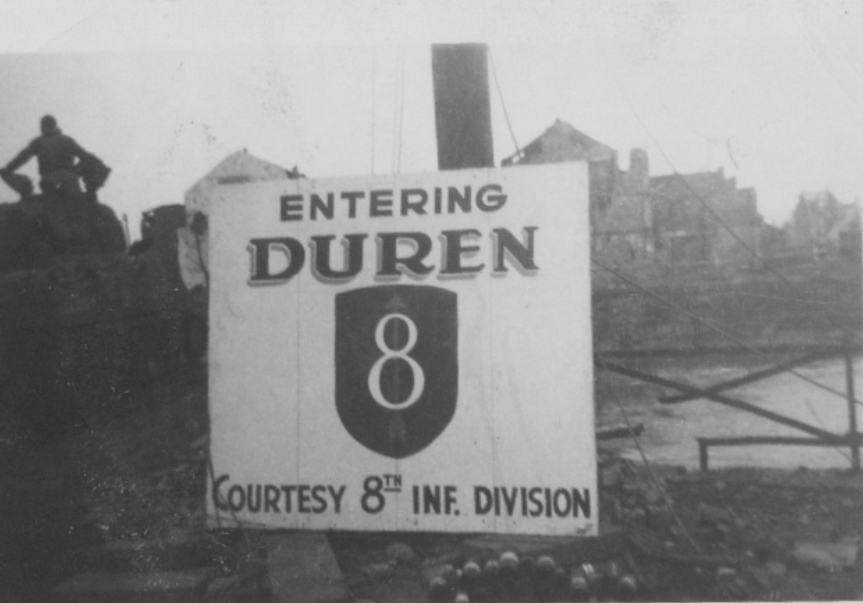
This group photo of soldiers with possibly a nurse is
uncaptioned. Barney Coen is the person standing, wearing the
helmet. In the background there appears to be the front section
of a German Volkswagon Kubelwagen military vehicle, the German
equivalent of the Allied 'jeep'. Do you know who these
people are, they may have served with the air liaison unit in
8th Infantry Division or have served with the artillery units
of this Division
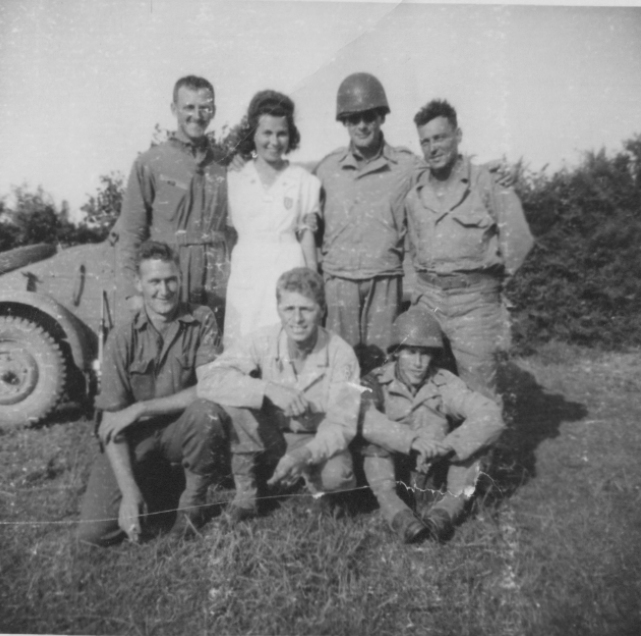
Compiled by Dennis Burke, 2025 Dublin and Sligo. With thanks to the Coen and Kirkpatrick families. And also to the Irish Military archives, B. Boudou, Itallo Battioli and the late Bill Stratton.
